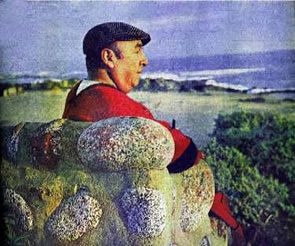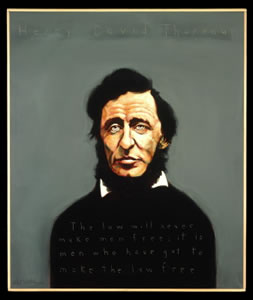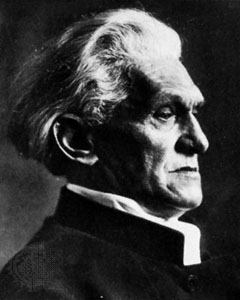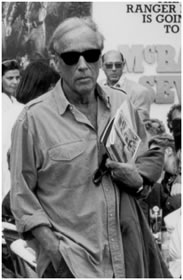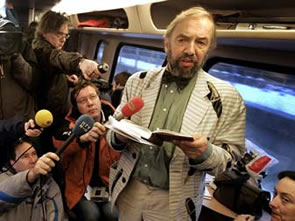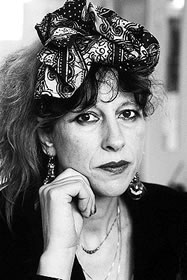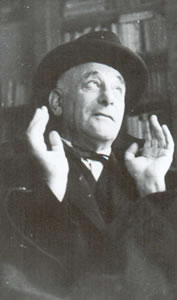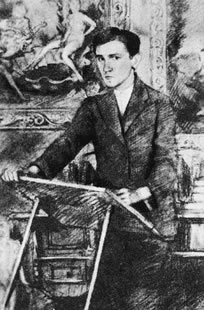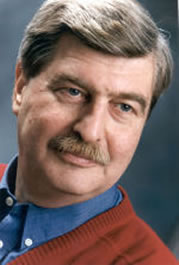De Chileense dichter Pablo Neruda (eig. Ricardo Eliecer Neftalí Reyes Basoalto) werd geboren in Parral op 12 juli 1904. Zie ook mijn blog van 12 juli 2007.
And because Love battles
And because love battles
not only in its burning agricultures
but also in the mouth of men and women,
I will finish off by taking the path away
to those who between my chest and your fragrance
want to interpose their obscure plant.
About me, nothing worse
they will tell you, my love,
than what I told you.
I lived in the prairies
before I got to know you
and I did not wait love but I was
laying in wait for and I jumped on the rose.
What more can they tell you?
I am neither good nor bad but a man,
and they will then associate the danger
of my life, which you know
and which with your passion you shared.
And good, this danger
is danger of love, of complete love
for all life,
for all lives,
and if this love brings us
the death and the prisons,
I am sure that your big eyes,
as when I kiss them,
will then close with pride,
into double pride, love,
with your pride and my pride.
But to my ears they will come before
to wear down the tour
of the sweet and hard love which binds us,
and they will say: “The one
you love,
is not a woman for you,
Why do you love her? I think
you could find one more beautiful,
more serious, more deep,
more other, you understand me, look how she’s light,
and what a head she has,
and look at how she dresses,
and etcetera and etcetera”.
And I in these lines say:
Like this I want you, love,
love, Like this I love you,
as you dress
and how your hair lifts up
and how your mouth smiles,
light as the water
of the spring upon the pure stones,
Like this I love you, beloved.
To bread I do not ask to teach me
but only not to lack during every day of life.
I don’t know anything about light, from where
it comes nor where it goes,
I only want the light to light up,
I do not ask to the night
explanations,
I wait for it and it envelops me,
And so you, bread and light
And shadow are.
You came to my life
with what you were bringing,
made
of light and bread and shadow I expected you,
and Like this I need you,
Like this I love you,
and to those who want to hear tomorrow
that which I will not tell them, let them read it here,
and let them back off today because it is early
for these arguments.
Tomorrow we will only give them
a leaf of the tree of our love, a leaf
which will fall on the earth
like if it had been made by our lips
like a kiss which falls
from our invincible heights
to show the fire and the tenderness
of a true love.
I Do Not Love You Except Because I Love You
I do not love you except because I love you;
I go from loving to not loving you,
From waiting to not waiting for you
My heart moves from cold to fire.
I love you only because it’s you the one I love;
I hate you deeply, and hating you
Bend to you, and the measure of my changing love for you
Is that I do not see you but love you blindly.
Maybe January light will consume
My heart with its cruel
Ray, stealing my key to true calm.
In this part of the story I am the one who
Dies, the only one, and I will die of love because I love you,
Because I love you, Love, in fire and blood.
Sonnet XXV
Before I loved you, love, nothing was my own:
I wavered through the streets, among
Objects:
Nothing mattered or had a name:
The world was made of air, which waited.
I knew rooms full of ashes,
Tunnels where the moon lived,
Rough warehouses that growled ‘get lost’,
Questions that insisted in the sand.
Everything was empty, dead, mute,
Fallen abandoned, and decayed:
Inconceivably alien, it all
Belonged to someone else – to no one:
Till your beauty and your poverty
Filled the autumn plentiful with gift.
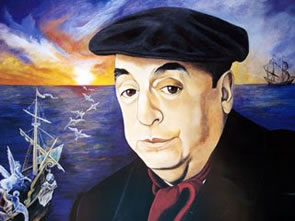
Pablo Neruda (12 juli 1904 – 23 september 1973)
De Duitse dichter en schrijver Stefan George werd geboren op 12 juli 1868 in Büdesheim. Zie ook mijn blog van 13 juli 2006. en ook mijn blog van 12 juli 2007.
Nacht-Gesang I
Mild und trüb
Ist mir fern
Saum und fahrt
Mein geschick.
Sturm und herbst
Mit dem tod
Glanz und mai
Mit dem glück.
Was ich tat
Was ich litt
Was ich sann
Was ich bin:
Wie ein brand
Der verraucht
Wie ein sang
Der verklingt.
Der Erkorene
Sie grüssen dich laut zur schönern geburt
Den dunkel umfing verherrlicht ein schein.
Was schwer sich erwirbt ward früh dir bestimmt
Dir gaben den preis die meister im lied.
Was huldigt erhöht du nahmest es zag
Die stirne geneigt doch froh dir bewusst
Wie jeglichem ding in ehrfurcht genaht –
So zogest du gern dem leben entlang
Mit prüfendem blick und liebend allein
Und griffest nur zu mit lauterer hand
In frommer beschau mit rühmlicher scheu:
Dem reicheren trieb des edleren tiers.
Was heute dich krönt wird dornige last
Dem jemals es welkt. der selbst sich nicht wahrt.
Nur wenn du noch ehrst bist du dir noch treu
Dann bleibt wie du dir o jüngling der kranz!
Du trugst in holder scham die stirn gesenkt
Du trugst in holder scham die stirn gesenkt
Ich ahnte wo dein buch im dunkeln liess:
Wann geist wann leib bestimmt der Sinn .. dir weist
Allein was achse ist was rollend rad ·
Wandelnd und bleibend heil · lebendige hand.
Damals beim mahl griff dich des mahles herr:
In seiner lohenden entzückung schwall
Und in der inbrunst lang gestauten glücks
Versank nicht nur der geist – es schwieg der leib
Als spät du auf mein lager kamst geschlichen.
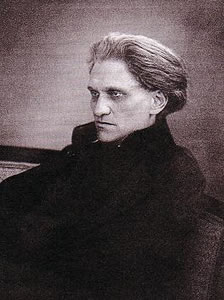
Stefan George (12 juli 1868 – 4 december 1933)
De Nederlandse dichter Driek van Wissen werd geboren in Groningen op12 juli 1943. Zie ook mijn blog van 12 juli 2007.
MIDDELBAAR ONDERWIJS
Het mooiste meisje van de klas
V
erschikt onwennig bij haar schouder
Een bandje van haar bustehouder;
Ze draagt dat rare ding maar pas.
De meester, achter brillenglas
Ziet toe, ontroerd, en denkt: Wat zou d’r
Gebeuren als zij tien jaar ouder
En ik eens tien jaar jonger was?
Ach, hij vergeet hoe hij verdorde
En hoe haar leven net begint.
In stilte wordt door hem bemind
De schone vrouw, die zij zal worden.
Dan praat ze wat, het lieve kind
En streng roept hij haar tot de orde.
MOEDER EN KIND
Mijn moeder leefde voor zichzelf te lang;
Vandaar dat zij haar laatste grijze dagen
Veelal verdeed met mopperen en klagen,
Een vruchteloze, zure zwanenzang.
Toch schepte zij een kinderlijk behagen
In onze dagelijkse ommegang
Als ik weg uit het huis, uit haar gevang
Haar rondreed in haar invalidenwagen.
De vreugde was niet altijd onverdeeld:
Ik deed het half uit liefde, half verveeld,
Maar ik kwam in het park soms halverwege
Een moeder met een kinderwagen tegen
En zag dan het verdraaide spiegelbeeld
Hoe ik ooit in haar wagen had gelegen.

Driek van Wissen (Groningen, 12 juli 1943)
De Nederlandse dichteres en schrijfster Carla Bogaards werd geboren in Voorburg op 12 juli 1947. Zie ook mijn blog van 12 juli 2007.
Jonge koninginnen
Grieten waren we, blond, met blauwe ogen, we reden op ezels langs
de vloedlijn, en de golven leken op palmtakken, zo groen, en de
branding bruiste als bronwater, zo licht als de dag.
We waren niet blond, we waren donker met donkere ogen.
We waren niet wat jij zegt …het is een schilderij van Isaac Israëls,
kijk de ezeltjesoren, de oren in de nek.
Je brengt me in verwarring, ik zou liever willen dat het leven zich voegt, alsnog,
wassende maan, eb en vloed.
Nee, ik weet het al, het zijn mijn dochtertjes, ze dragen
zonnehoedjes. Zie je hun ogen schitteren.
Je hebt alleen zoons, misschien zijn het jouw onvoldragen baby’s,
je huilde, en je bent de weg overgestoken, expres, roekeloos, het
speelde zich af in een koninginnesprookje.
God schiep de wateren onder het uitspansel, mijn broer nam me op
zijn schouders, hij liep de zee in, de branding was rood van liefde
en de vissen sprongen tegen zijn buik, ik schreeuwde van angst en
spanning, niet toen ik de weg overstak. Werd ik behoed door een
engel? Of baande God een pad voor me.
God maakte een scheiding van de wateren die onder het uitspansel
waren en de wateren die boven het uitspansel waren. Later was er
een pad door de Rode Zee en nog later een pad tussen de idiotie van
hels verkeer. Of viel de wereld stil?
En het was alzo, en God noemde het uitspansel hemel. Rustte Hij
zoals op de zevende dag.
Moe van jou, de verzoeking, de bekoring die je zocht in de dood.
We hadden schouderlang haar, je leek op een zangeresje uit Parijs,
we liepen modieus en aanstellerig op blote voeten door Den Haag.
Je ontmoette je broer daar, jullie lachten, omhelsden elkaar. Zijn jullie
naar zee gegaan.
Nee, we zaten op een bankje bij de Hofvijver, een nieuwe zomer, we
waren gelukkig,
ik was nog nooit zwanger geweest, zo jong zo jong.
En het schilderij toonde mijn dochtertjes en de dood reed mee,
de dood rijdt altijd mee op de ezel,
elke scheppingsdag, dag na dag, de nachten onder de zwarte hemel,
het uitspansel met het maantje weerspiegeld in die vijver waarop
bootjes varen bedolven onder bloemen.
Langs het schelpenpad de bomen in het vijverwater, licht dat van zee
waait,
de hoefjes van de ezels in het zeewater.
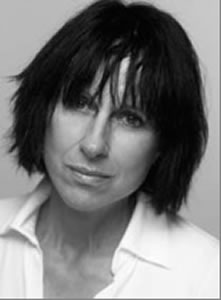
Carla Bogaards (Voorburg, 12 juli 1947)
De Franse dichter en schrijver Max Jacob werd op 12 juli 1876 geboren in Quimper. Zie ook mijn blog van 13 juli 2006. en ook mijn blog van 12 juli 2007.
GENRE BIOGRAPHIQUE
Déjà, à l’âge de trois ans, l’auteur de ces lignes était
remarquable : il avait fait le portrait de sa concierge en
passe-boule, couleur terre-cuite, au moment où celle-ci,
les yeux pleins de larmes, plumait un poulet. Le poulet
projetait un cou platonique. Or, ce n’était ce passe-boule,
qu’un passe-temps. En somme, il est remarquable qu’il
n’eut pas été remarqué: remarquable, mais non regret-
table, car s’il a e.vait été remarqué, il ne serait pas devenu
remarquable; il aurait été arrêté dans sa carrière, ce qui
eût été regrettable. Il est remarquable qu’il eût été
regretté et regrettable qu’il eût été remarqué. Le poulet
du passe-boule était une oie.
UNE DE MES JOURNÉES
Avoir voulu puiser de l’eau à la pompe avec deux pots bleus, avoir été pris de vertige à cause de la hauteur de l’échelle ; être revenu parce que j’avais un pot de trop et n’être pas retourné à la pompe à cause du vertige ; être sorti pour acheter un plateau pour ma lampe parce qu’elle laisse le pétrole l’abandonner ; n’avoir pas trouvé d’autres plateaux que des plateaux à thé, carrés, peu convenables pour des lampes et être sorti sans plateau. M’être dirigé vers la bibliothèque publique et m’être aperçu en chemin que j’avais deux faux cols et pas de cravate; être rentré à la maison ; être allé chez M. Vildrac pour lui demander une Revue et n’avoir pas pris cette Revue parce que M. Jules Romains y dit du mal de moi. N’avoir pas dormi à cause d’un remords, à cause des remords et du désespoir.

Max Jacob (12 juli 1876 – 5 maart 1944)
Zie voor onderstaande schrijvers ook mijn blog van 12 juli 2007.
De Amerikaanse schrijver en filosoof Henry David Thoreau werd geboren in Concord, Massachusetts op 12 juli 1817.
De Nederlands-Amerikaanse journalist en schrijver Hans Koning (pseudoniem van Hans Köningsberger) werd geboren in Amsterdam op 12 juli 1921.
De Poolse schrijver, schilder en graficus Bruno Schulz werd geboren op12 juli 1892 in Drohobycz, in Galicië.
De Friese schrijver Gerben Willem Abma werd op 12 juli 1942 geboren in Folsgare.

